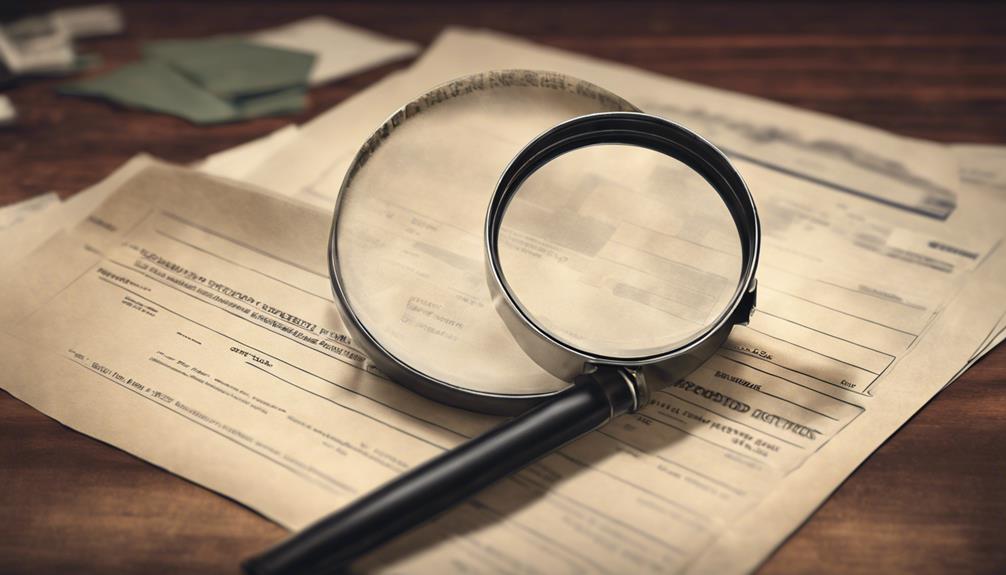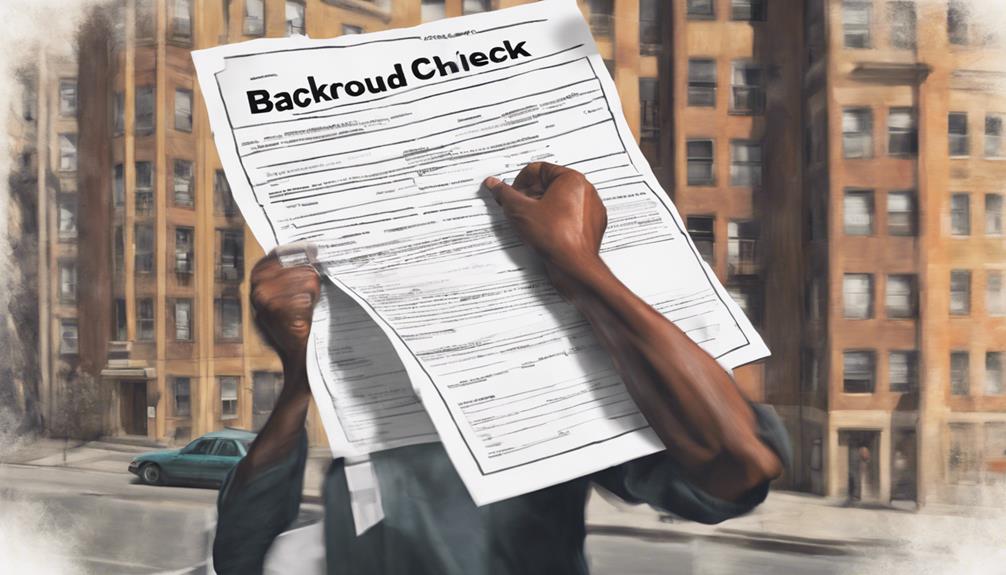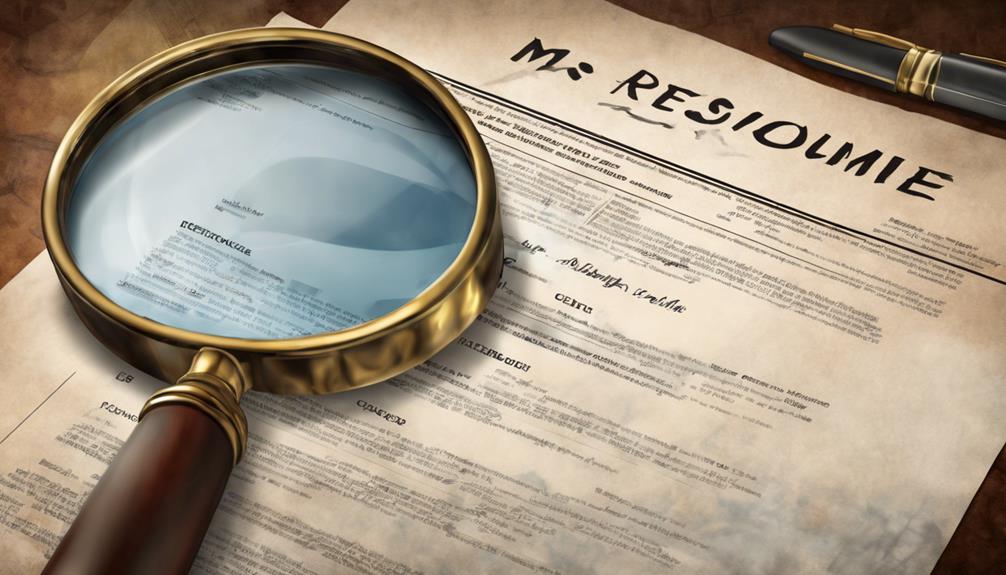FBI background checks unveil an individual's criminal history, covering arrests, convictions, and other documented criminal activities stored in the FBI's database. These checks are thorough and vital, providing insights into a person's past interaction with law enforcement. The information gathered assists in determining an individual's suitability for various purposes, including employment screenings and security clearances. This detailed overview guarantees employers and relevant authorities have a clear understanding of a person's background before making decisions. Understanding the importance of this data is crucial to making informed choices in specific situations.
Key Takeaways
- Criminal records, arrests, and convictions.
- Excludes medical history and credit reports.
- Focuses on FBI's database.
- Provides in-depth criminal history information.
- Essential for assessing job suitability.
Scope and Process of FBI Background Checks

The scope and process of FBI background checks involve a thorough examination of an individual's criminal and personal history. These checks are carried out by the FBI as the main federal background check provider for various purposes, including employment screenings and national background checks.
Information collected during FBI background checks covers a wide range, including criminal records, arrests, and convictions at federal, state, and local levels, as well as details about an individual's employment history and education.
To initiate the process, individuals must submit their fingerprints, which are then compared against criminal databases through the Integrated Automated Fingerprint Identification System (IAFIS). Importantly, FBI background checks focus only on information within the FBI's database and generally don't explore an individual's medical history or credit reports.
Criteria for Failing an FBI Background Check
How do specific factors impact the outcome of an FBI background check?
Certain criteria can lead to failing an FBI background check, such as:
- a criminal record,
- history of drug abuse,
- financial instability,
- lying or deception,
- and mental health issues affecting judgment.
Past criminal convictions, especially felonies and serious misdemeanors, are significant red flags that can result in a failed background check.
Additionally, any history of drug-related offenses or substance abuse problems can lead to disqualification.
Financial instability, including factors like bankruptcy, unpaid debts, and dishonesty, can also be grounds for failing the check.
Besides, mental health issues that impair judgment or pose a risk to others may disqualify an individual during the background check process.
These criteria are carefully considered by the FBI to ensure the safety and security of individuals and organizations involved.
Components of FBI Name Check

FBI Name Checks analyze criminal databases, arrest records, and wanted posters to assess an individual's criminal history. These checks are essential for determining job suitability and granting security clearances. While they provide valuable criminal history information, FBI Name Checks do not offer a comprehensive background check. It is crucial to note that these checks may not reveal all aspects of an individual's history, as they focus specifically on the criminal records searched by the FBI. Nonetheless, FBI Name Checks serve as a key tool in evaluating an individual's fitness for certain activities and positions.
| Components of FBI Name Check | |
|---|---|
| Searches | Criminal databases, arrest records, wanted posters |
| Focus | Criminal history information |
| Purpose | Assessing job suitability and security clearances |
Purpose, Accuracy, and Legal Aspects of FBI Background Checks
For evaluating an individual's background, FBI background checks play a vital role in providing detailed criminal history information. These checks encompass criminal history records, arrest details, warrants, convictions, and probation records. They're commonly utilized for various purposes such as employment screening, security clearances, adoption processes, immigration matters, and volunteer work. To guarantee accuracy, FBI background checks involve a thorough database search, access to national criminal databases, verification of identity through fingerprint submissions, and regular updates to records.
Legal aspects play an important role in the implementation of FBI background checks. Compliance with the Fair Credit Reporting Act (FCRA), Equal Employment Opportunity Commission (EEOC) guidelines, Ban the Box laws, and privacy rights of individuals are paramount. These legal considerations safeguard individuals from discrimination and ensure that background checks are conducted fairly and transparently. By adhering to these regulations, FBI background checks maintain integrity and reliability in providing vital information for various purposes.
Importance and Overview of Federal Background Checks

Federal background checks are a cornerstone of the hiring process, providing thorough insights into a candidate's federal criminal history.
Employers rely on these checks to assess eligibility, qualifications, and guarantee the safety of their workplace.
Compliance with regulations is essential for conducting effective federal background checks across various industries.
Federal Background Check Overview
Conducting thorough background checks is an essential step in the hiring process for many positions requiring a high level of trust and responsibility. Federal background checks, including FBI background checks and federal criminal background checks, play a significant role in evaluating a candidate's federal criminal history. These checks are vital for roles in public safety, positions involving vulnerable populations, and responsibilities related to financial matters.
Federal background checks search federal crimes across all US district courts, providing employers with detailed insights into a candidate's criminal background. These checks utilize databases such as the National Crime Information Center and the Fingerprint Identification System to ensure detailed results. Importantly, federal background checks don't typically include expunged or sealed records.
Additionally, employers must adhere to the adverse action process outlined in the Guide to Federal Background Checks when making decisions based on the information obtained. Compliance with regulations is crucial to conducting thorough and lawful federal employment background checks.
Key Components Covered
A detailed evaluation of an individual's criminal history and background is vital for various high-trust roles and activities. FBI background checks play a pivotal role in providing detailed reports covering arrests, charges, convictions, and prison records. These checks are instrumental in determining eligibility for positions, security clearances, immigration processes, and other situations where trust is paramount.
Fingerprints collected during these checks are stored in the Integrated Automated Fingerprint Identification System (IAFIS), ensuring a thorough national database of criminal histories. The information gathered in FBI background checks aids decision-making processes by presenting a range of results, from individuals with a clean record to those with multiple criminal infractions.
Importance in Screening
Screening processes rely heavily on thorough background investigations to evaluate an individual's federal criminal history and suitability for various high-trust roles. Employers utilize federal background screenings to assess candidates' eligibility, qualifications, and safety considerations, thereby reducing legal risks and ensuring compliance with regulations.
These screenings provide detailed insights into a candidate's criminal history from federal courts, enhancing the screening process by offering a comprehensive view of an individual's background. By incorporating federal background screenings into their hiring practices, employers can make informed decisions, particularly for roles involving sensitive information, public safety, and financial matters.
Additionally, conducting these screenings promotes fair hiring practices and helps organizations mitigate potential risks associated with hiring individuals with undisclosed criminal histories. Overall, federal background screenings play a crucial role in safeguarding workplaces, maintaining legal compliance, and ensuring the integrity of the screening and hiring processes.
Specific Scenarios and Differentiation With State Background Checks
Federal background checks and state checks provide unique insights into an individual's criminal history. The handling of misdemeanors or expunged records differs significantly between these two types of screenings.
Understanding the variations in disclosure requirements is crucial in distinguishing between federal and state background checks.
Federal background checks and state checks offer distinct perspectives on an individual's criminal history. The impact of a misdemeanor or expunged record can vary between the two types of screenings.
Differences in disclosure requirements further underscore the need to comprehend the nuances between federal and state background checks.
FBI Vs State Checks
In specific scenarios requiring background checks, the differentiation between FBI and state checks becomes vital for individuals seeking employment in various industries. Federal background checks primarily focus on federal crimes prosecuted in US district courts, making them important for roles involving public safety or financial matters.
On the other hand, state background checks explore state and county records, concentrating on local offenses within a specific state. This distinction is particularly significant when considering misdemeanors, as the impact of a misdemeanor on a federal background check may vary from state policies.
Additionally, the process of expungement can differ between federal and state background checks, with expunged records on a federal level not necessarily resulting in disqualification. Understanding these nuances between federal and state background checks is crucial for individuals navigating the requirements of different industries and ensuring compliance with specific regulations.
Misdemeanor Impact
Investigating the implications of misdemeanor records on background checks, especially when compared to state-level screenings, offers valuable insights for individuals managing employment opportunities and regulatory requirements.
Misdemeanors may or may not appear on FBI background checks, with the severity and recency of the offense playing vital roles in their inclusion. Federal agencies and employers often consider specific misdemeanor convictions when conducting suitability assessments.
State background checks typically provide more detailed information about misdemeanors compared to federal screenings. The impact of a misdemeanor on a federal background check depends on the nature of the offense and its relevance to the position or security clearance being sought.
Understanding the nuances of misdemeanor disclosures in federal background checks is essential for individuals handling job applications and clearance processes effectively, as it can greatly influence their eligibility for certain roles or security clearances.
Record Disclosure Differences
Comparing record disclosure between federal and state background checks reveals significant variations in the information provided about an individual's criminal history. Federal background checks primarily focus on federal crimes prosecuted in US district courts, while state background checks concentrate on state or county records.
Roles necessitating federal background checks often involve public safety, working with vulnerable populations, and managing financial matters. When it comes to misdemeanor offenses, passing a federal background check with a misdemeanor conviction depends on the nature of the offense and specific job requirements.
One critical distinction is how expunged records are handled. While expunged records may not surface in federal background checks, they could potentially show up in state background checks.
Adverse actions and record disclosures in federal background checks adhere to precise guidelines and considerations outlined by federal regulations, ensuring a standardized approach to evaluating an individual's criminal background for various job requirements and roles involving vulnerable populations or financial matters.
Frequently Asked Questions
What All Does a FBI Background Check Show?
An FBI background check typically reveals criminal history details, personal information like fingerprints and aliases, court-ordered fines, bankruptcy details, and other relevant data. It may not include credit history but can cover tax liens and property ownership.
What Is the Difference Between FBI Background Check and Federal Background Check?
In a world of background checks, the difference between FBI and federal lies in depth. FBI checks paint a detailed portrait of personal and criminal past, while federal focuses on convictions in federal court.
What Does the FBI Name Check Include?
The FBI name check includes searches of criminal databases for arrest details, convictions, and wanted posters. Results are crucial for determining suitability for activities like job placements. It's not an exhaustive check and may not reveal all history.
How Long Does an FBI Agent Background Check Take?
An FBI agent background check typically takes 24-48 hours for electronic submission and processing. The processing time may vary based on complexity and FBI backlog. Results are received electronically upon completion.
What Information Does an FBI Background Check Include Compared to a Rental Background Check?
When comparing the information included in an FBI background check versus a rental background check, the rental background check length is typically limited to past rental history, credit score, and potential criminal records related to fraud or eviction. The FBI background check, on the other hand, encompasses a broader scope, including criminal history, fingerprints, and federal employment suitability.
Conclusion
To sum up, FBI background checks are an essential tool in ensuring safety and security in various aspects of society.
Notably, the FBI conducted over 39 million background checks in 2020 alone, highlighting the importance of this process in upholding public trust and safeguarding communities.
Keep in mind, these checks play a crucial role in keeping our country safe and secure.









